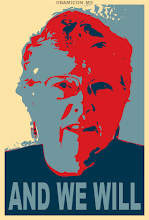Ways and (Russell) Means - washingtonpost.com
Over four decades, Russell Means has led an insurrection, posed for Andy Warhol, aspired to be an assassin and been arguably the most influential public figure in fighting racism against the American Indian. Now, in his quest to start his own country, the road to success might run down Embassy Row.
By Bill Donahue
Sunday, June 29, 2008; Page W08
The voice was booming and imperious as it came out of the bathroom, wafting over the blandly hip decor of the Dupont Circle hotel room. "If you excuse me a moment," said Russell Means, "I'm going to braid my hair."
I knew that Means was not talking about some quick twist-and-tie ponytail job, but rather the painstaking culmination of a resplendent costume. Means is 6-foot-1, with a powerful broad-boned physique. He is the actor who played the last Mohican in the 1992 film "The Last of the Mohicans," and he is the onetime leader of the revolutionary American Indian Movement, or AIM. Arguably the most famous living Indian activist, he performs his role with panache. Already on this bright, cold morning in February, he was wearing dangling turquoise earrings, a crimson wool Navajo vest and black silver-tipped cowboy boots. His broad, truculent brow was creased with wear.
Means's life has been something like a Johnny Cash song. He has done prison time for inciting a riot, and has been stabbed, accused of murder, hit by two bullets and divorced four times. Long ago, he was a fancy dance champion and a rodeo star. Even now, at age 68, he remains a forceful presence -- a warrior.
On this visit to the nation's capital, Means was, per usual, fighting the United States of America. Along with three other Lakota Indians, he had recently severed his ties with the United States and declared himself a founding member of a new, autonomous nation -- the Republic of Lakotah. Unsanctioned by their tribal government, and speaking only for themselves, the dissidents claimed dominion over more than 93,000 square miles of traditional Lakota territory -- a continuous chunk of sparsely populated dry land that includes parts of Nebraska, South Dakota, North Dakota, Montana and Wyoming.
Means was here in Washington seeking diplomatic recognition from the world community so that he could ultimately finagle a seat at the United Nations, whether the U.S. of A. likes it or not. His motto, borrowed from Gandhi, is, "First they ignore you, then they laugh at you, then they fight you, then you win."
The plan was to barnstorm Embassy Row. He hoped to visit ambassadors from several U.S. adversaries (Venezuela and Serbia, for instance) as well as from a few other countries he deemed likely allies -- for instance, Bolivia, which has an indigenous president in Evo Morales, and Finland, which, in Means's view, "appreciates freedom because it's always been an independent ally of Russia."
It would be a four-day mission, and Means was traveling with an attache, Lakotah's volunteer attorney general, Jerry Collette. A Libertarian activist and a paralegal who recently emigrated to Lakotah from his longtime home in North Carolina, Collette is most renowned for the intricate, loopholing legal work he did last winter to enable the supporters of presidential candidate Ron Paul to fly a campaign blimp up and down the East Coast. Ethnically French-Canadian, Collette is 56 years old, with long gray hair and a shaggy gray beard. In contrast to Means, he is a meager physical presence -- slender and only 5-foot-4. On this road trip, as Means luxuriated on the hotel's single queen bed, Collette was sleeping on the floor. "I'm a guerrilla," he explained, "and if you're a guerrilla, you just don't grumble about little discomforts."
At the moment, Collette was standing outside the bathroom, valet-like, reporting on the progress he'd made that morning, canvassing embassies on his cellphone. "I called Iceland," he said, "and they can't meet with us. They're busy. They said to just drop off a petition."
"They're busy?" Means asked. "What does Iceland have to be busy about?"
Collette paused a moment, and then, without answering, he said, "But can we just drop off the petition?"
"We're too busy," Means said, his voice laced with a larksome, sardonic swagger, and Collette went back to his phone, squaring away the logistics for a full afternoon of visiting embassies.
After a few minutes, Means emerged. His braids were done, and now he reached for his sunglasses -- Dolce & Gabbanas.


Links to this post:
Create a Link
<< Home